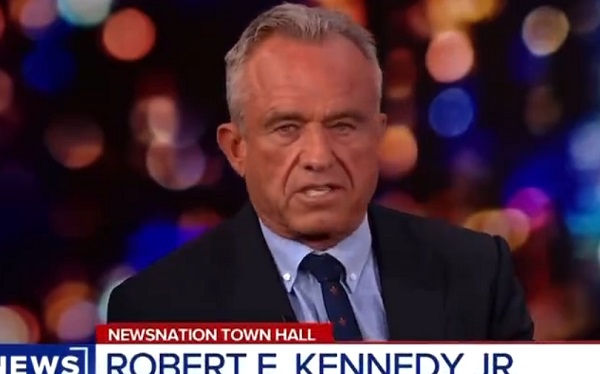International
RFK Jr: Trump has ‘asked me to clean up the corruption’ in federal health agencies

From LifeSiteNews
Robert F. Kennedy Jr. said he has been tasked by Donald Trump with ending the conflicts of interest that now compromise the integrity of U.S. health agencies, with devastating ripple effects on the well-being of Americans.
Former Democrat-turned-independent presidential candidate Robert F. Kennedy Jr. said Wednesday that former President Donald Trump has asked him to reorganize and “clean up” federal health agencies like the CDC and FDA if Trump is re-elected in November.
Kennedy, who joined Trump’s presidential transition team in late August after dropping out of the race himself and then endorsing the former president, shared in an appearance on NewsNation that Trump wants him to “reorganize the federal health agencies” affecting human health, including the Centers for Disease Control and Prevention (CDC), the National Institutes of Health (NIH), the Food and Drug Administration (FDA), as well as some of the agencies within the USDA.”
“He’s asked me to clean up the corruption, number one,” Kennedy said. “Number two, end the conflicts of interest.”
In recent years, Kennedy has spoken much publicly about the pattern of corruption and conflicts of interest that he witnessed firsthand during his many years as an environmental attorney. During Kennedy’s presidential run, he discussed how the “corporate capture” of regulatory agencies is the “biggest threat to American democracy.”
As Kennedy explained during his Wednesday NewsNation appearance, “When you litigate these agencies, you get a Ph.D. in corporate capture and how to unravel it.”
According to Kennedy, the problem is pronounced in health agencies, where for example, the FDA “gets 50 percent of its budget from Big Pharma” and the NIH “collects royalties when (a) pharma company sells (its) product,” as he explained in an interview last year.
Kennedy went on to share Wednesday that he has been tasked by Trump with “return(ing)” those U.S. health agencies “to their rich tradition of gold-standard, empirically based, evidence-based medicine.”
He shared that Trump has also tasked him with ending “the chronic disease epidemic in this country,” adding, “And he’s asked me specifically to measurably reduce chronic disease in our children within two years.”
On Wednesday, he cited statistics showing unprecedented, drastically poor patterns of health in Americans, especially in children.
“When I was a kid and my uncle was President, six percent of Americans had chronic disease. Today, it’s 60 percent,” RFK Jr. said in reference to John F. Kennedy, who was president from 1961 to 1963.
According to Kennedy, a staggering “77% of American boys cannot qualify for the military because of a chronic disease, and that while when he was a child, “the average pediatrician saw one case of diabetes in his lifetime,” now one out of every three kids is diabetic or pre-diabetic.
He further shared that in his generation, only “one in 10,000” has full-blown autism, whereas now the rate is one in 34 children.
“This is an existential threat to the country,” said Kennedy, adding that Trump wants his “legacy to the American people” to be “the end of the chronic disease epidemic.”
International
Germany launches first permanent foreign troop deployment since WW2

 MxM News
MxM News
Quick Hit:
Germany activated a 5,000-strong armored brigade in Lithuania — marking its first permanent foreign military deployment since World War II. The move strengthens NATO’s eastern flank amid Ukraine’s ongoing conflict with Russia.
Key Details:
- The 45th Armored Brigade was formally launched outside Vilnius on Tuesday.
- Germany plans for the brigade to be fully operational by 2027 in Rūdninkai, near the Belarus border.
- The deployment marks a major policy shift for Berlin and a boost for NATO’s deterrence posture.
Diving Deeper:
Germany has officially entered a new era of military engagement, launching its first permanent foreign troop deployment since the end of World War II. The move, announced Tuesday, sees the activation of a 5,000-strong armored brigade in Lithuania as part of a broader NATO strategy to counter the perceived threat from Russia.
The newly formed 45th Armored Brigade was ceremonially inaugurated outside the Lithuanian capital, Vilnius. German Brigadier General Christoph Huber assumed command, overseeing the establishment of a temporary headquarters and unveiling the unit’s crest. “We have a clear mission: to ensure the protection, freedom and security of our Lithuanian allies on NATO’s eastern flank,” Huber said, adding that the unit’s presence also directly contributes to the defense of Germany and NATO as a whole.
The deployment follows a pledge made by Berlin in 2023 — a decision that broke with decades of postwar defense policy rooted in military restraint. German officials had long avoided permanently stationing combat troops abroad. That posture has changed in response to Russia’s ongoing war in Ukraine, which has turned the Baltic region into one of NATO’s most vulnerable frontlines.
Germany’s commitment includes more than just fighting forces. The brigade will also feature key support elements, such as a medical center, communications specialists, and command support units dispersed across multiple Lithuanian locations. Troops will initially operate out of temporary facilities, with a permanent base under construction in Rūdninkai, located roughly 30 kilometers south of Vilnius.
Currently, 150 German soldiers are already on the ground in Lithuania. That figure is expected to rise to 500 by the end of the year as the new brigade scales up operations.
Censorship Industrial Complex
China announces “improvements” to social credit system

 MxM News
MxM News
Quick Hit:
Beijing released new guidelines Monday to revamp its social credit system, promising stronger information controls while deepening the system’s reach across China’s economy and society. Critics say the move reinforces the Communist Party’s grip under the banner of “market efficiency.”
Key Details:
- The guideline was issued by top Chinese government and Communist Party offices, listing 23 measures to expand and standardize the social credit system.
- It aims to integrate the credit system across all sectors of China’s economy to support what Beijing calls “high-quality development.”
- Officials claim the new framework will respect information security and individual rights—despite growing global concerns over surveillance and state overreach.
Diving Deeper:
China is doubling down on its social credit system with a newly issued guideline meant to “improve” and expand the controversial surveillance-driven program. Released by both the Communist Party’s Central Committee and the State Council, the document outlines 23 specific measures aimed at building a unified national credit system that will touch nearly every corner of Chinese society.
Framed as a tool for “high-quality development,” the guideline declares that credit assessments will increasingly shape the rules of engagement for businesses, government agencies, and individual citizens. The system, according to the National Development and Reform Commission (NDRC), has already played a role in shaping China’s financial services, government efficiency, and business environment.
Critics of the social credit system have long warned that it serves as an instrument of authoritarian control—monitoring citizens’ behavior, punishing dissent, and rewarding obedience to the Communist Party. By integrating credit data across all sectors and enforcing a “shared benefits” model, the new guideline appears to entrench, not ease, the Party’s involvement in everyday life.
Still, Beijing is attempting to temper foreign and domestic concerns over privacy. The NDRC emphasized that the system is being built on the “fundamental principle” of protecting personal data. Officials pledged to avoid excessive data collection and crack down on any unlawful use of information.
-

 2025 Federal Election11 hours ago
2025 Federal Election11 hours agoPoilievre To Create ‘Canada First’ National Energy Corridor
-

 Automotive2 days ago
Automotive2 days agoAuto giant shuts down foreign plants as Trump moves to protect U.S. industry
-

 Energy1 day ago
Energy1 day agoTrump Takes More Action To Get Government Out Of LNG’s Way
-

 2025 Federal Election1 day ago
2025 Federal Election1 day agoMainstream Media Election Coverage: If the Election Was a NHL Game, the Ice Would be Constantly Tilted Up and to the Left
-

 Health1 day ago
Health1 day agoSelective reporting on measles outbreaks is a globalist smear campaign against Trump administration.
-

 COVID-192 days ago
COVID-192 days agoTrump’s new NIH head fires top Fauci allies and COVID shot promoters, including Fauci’s wife
-

 COVID-196 hours ago
COVID-196 hours agoMaxime Bernier slams Freedom Convoy leaders’ guilty verdict, calls Canada’s justice system ‘corrupt’
-

 2025 Federal Election1 day ago
2025 Federal Election1 day agoMark Carney is trying to market globalism as a ‘Canadian value.’ Will it work?







